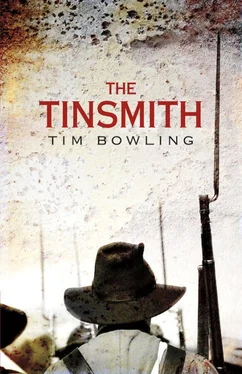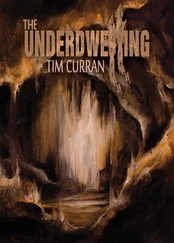The thought of life’s futility—not entirely new to him, but never before draped in such black colours in such a lonely place—put the river beneath his feet, the salt of some great untraversable distance on his mouth. With a sigh, Anson continued his slow walk back toward the house.
• • •
Three hours later, as Henry Lansdowne steered the skiff into the wharf at Crescent Slough, Anson shivered at the eerie silence hovering over Dare’s settlement. By the time he stepped out of the skiff onto a small, black wharf, even the almost-ceaseless gull cry above the river had stopped, leaving only the sighings and gurglings of the slight current, the drone of mosquitoes, and, every few minutes, the incongruously cheerful trill of a blackbird or robin. Anson looked up at the earthen dike, twenty feet above the wharf and stretching southward along the riverbank toward a cluster of buildings similar to those that constituted the Lansdownes’ cannery. Similar but with some clear differences.
Dare’s main building was several hundred feet long, low—perhaps a dozen feet high—open-ended at the riverside and without windows. And its lumber was almost blond compared with the dark planks of the Lansdownes’ cannery, perhaps, Anson thought, because it had been more recently built. But there was something disturbing about this white building. It did not look new so much as scoured, like a beached whale that had been gnawed down to its skeleton by the elements. And it stood out dramatically, because all the smaller buildings—A-framed and also windowless, likely used, as at Chilukthan, for net storage—were darker and touched in places with a dark green slime.
“I’ll wait here,” Henry Lansdowne said and lowered his head toward the gnarled fold of hands in his lap. “Just in case. Fifteen minutes, mind. No more than that.”
Anson shook off the foreboding caused by his first sight of the white cannery building and almost smiled. Just in case of what? That Dare might chase him off with a gun as well?
“Thank you. I’ll come back as soon as I can to let you know if I’m staying.”
His calf and thigh muscles still aching from his rescue of the Chinese, Anson climbed the gangway and, upon reaching the dike, surveyed the immediate vista.
In a hollow about fifty yards away, a plain-planked, two-storey house sat in a foot of muddy water surrounded by huge weeping willows, their yellow fronds motionless. Another fifty yards off to one side of the building, near a cluster of cottonwoods, a canvas tent had been constructed. No one moved near the house or the tent, and no smoke rose against the blue sky. Anson approached the house. A single window, facing riverward, was boarded up, with perhaps an inch showing between boards. Anson peered in, conscious of not wanting to make Henry Lansdowne wait the full fifteen minutes. As he did so, a dog began to bark fiercely inside, its dark shape sliding across the broken sunlight falling into a large room filled with junk. Anson stepped back, then braved the dog’s noise by staring through the gap again until his eyes adjusted to the gloom. Now he could see clothing scattered everywhere, cooking utensils, what looked like animal hides and pieces of fishnet. The barking increased, more shapes slid toward the window. Then Anson noticed the figures seated on the floor; they appeared to be weaving something. A body unfolded itself from the shadows and called to the dogs in a strange tongue. The dogs quieted and the body vanished. Anson stepped back again in confusion. Why should Dare have allowed his house to become an Indian village? At Chilukthan, the Indians camped on the riverbank, on the opposite side of the slough mouth.
Then Anson remembered the tent, and the explanation came to him. Dare would not be the only veteran of the war who preferred camp life to more civilized surroundings. After years of living rough, away from furnished rooms with only a simple fire and simpler meals to afford any material comfort, many ex-soldiers struggled to adjust to society. Of course, in such a forlorn place as this, with society so lacking, a man like Dare was free to arrange his living conditions to suit himself. And besides, he had been a slave; there was no telling what degrading conditions he’d once known. In any case, Anson had never asked Dare about his enslavement; to have done so at Antietam would have been to pour vinegar in an open wound. And afterwards, it had never seemed useful or tactful to raise the subject in a letter.
As he started toward the tent, Anson even envied Dare that particular kind of domestic freedom; many was the time he’d felt trapped by genteel surroundings, not to mention genteel manners. For a long while after he’d resigned his commission, the opium had given him an escape, and finally his love for Elizabeth had made everything that confined him a rare and exhilarating openness. But his blood never ceased to quicken at the sight of a campfire.
Dare’s fire was cold ash, however. And the tent, musty, stained green with mildew, was empty except for a few blankets. Anson decided to check out the cannery. If he did not find Dare there, he’d have to either send Henry Lansdowne back alone or go with him. While he understood the veteran’s fondness for camp life, Anson wasn’t entirely sure he’d like to forego the comfort and company of Chilukthan while he waited for Dare to come back from wherever he was.
On the earthen dike above the cluster of cannery buildings, he hesitated. The stillness below was somehow uninviting, but he descended and began to explore the dusky interiors, starting with the long, low building, which must have been new, since its walls exuded a powerful scent of cedar. But the freshness vanished as Anson stared at the long, waist-high wooden tables and sluices, the greasy bulk of silent machines, the complicated chains and gears and belts ominous in their static condition, like diseased animals waiting to die. The interior was a large, unpartitioned space, yet it felt cramped, oppressive. A strong smell of blood and salt rose off the planks, and several pieces of salmon—a severed tail, some gobs of red flesh—lay in the shadowy corners. Obviously the cannery had been working recently; even the machines gave off a burnt, acrid smell as Anson leaned closer to them.
In a smaller building, he discovered something remarkable: hundreds of thousands of empty, lidless tins, stacked fifteen feet high, right up to the rafters, gave a silver shock of brightness to the gloom. Anson stared at them in awe. How did Dare have so many? Perhaps this was the reason he could chase his crew away.
The doctor did not brood long over these questions. They seemed less important than the restless, shifting loneliness that prowled the wet rods between Dare’s home and his cannery. As Anson stood by the tins, the breeze through the door brought a low whistling out of them, as though in warning. His skin prickled. Something alive in the emptiness of the whole settlement disturbed him. He had the eerie feeling that the machines were going to whir into action at any second and that the planks of the buildings and the dirt of the dike would be fed into them. The question of Dare’s whereabouts had almost slipped his mind when he backed away from the tins and turned directly into the path of an elderly Chinaman holding a shotgun.
“What you want?” The Chinaman raised the gun before him, straight upright, and floated back a few steps, turning his head quickly from side to side as if convinced other white men unknown to him might appear at any second. Thin and tall, he wore a long pigtail and a faded blue smock. One eye was milky, likely blind.
Recovering from his shock, Anson grew irritated at the man’s aggression.
“I’ve come to see your boss,” he said. “Where is he?”
Читать дальше












